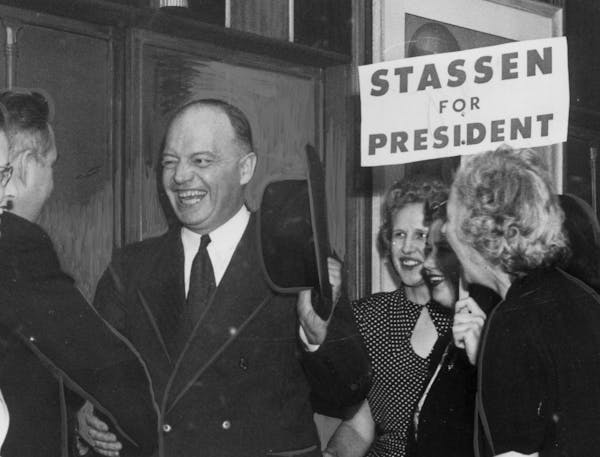The 1948 Democratic National Convention was a pivotal moment in Hubert Humphrey's life as he used a major stage to try and shift his party on an issue that would define his political career.
The DFL icon's tenure as mayor of Minneapolis — and the fierce racism and antisemitism in the city around that time — is detailed in a new book, which looks back at the moment young Humphrey helped push Democrats to make a historic commitment to civil rights.
"Against [President Harry] Truman's own wishes, against the threat of the Southern segregationists to walk out, as of course they ultimately did, he got the civil rights plank passed as a 37-year-old mayor of a midsize city," author Samuel G. Freedman said in an interview about Humphrey's success at the convention. "He'd only been elected to office for three years. He was a kid, politically speaking. And that's a huge achievement."
Freedman's book, "Into the Bright Sunshine: Young Hubert Humphrey and the Fight for Civil Rights," is set to be released July 14. The former New York Times columnist and reporter, who is now a Columbia University professor, writes about Humphrey's upbringing in South Dakota and charts his education and early political work.
He also highlights key activists who helped bring about change.
"I was very conscious from the very beginning of this book of constellating people around Humphrey and looking at who his allies were in the Black and Jewish communities in particular, and making it clear that although what he accomplished was extraordinary, he didn't do it by fiat or magic, and he didn't do it by any means by himself," Freedman said.
Freedman details how Humphrey was able to take his upbringing, and a life-changing stint in the Jim Crow South as a graduate student at Louisiana State University, to inform his approach to politics and civil rights. Discrimination and attacks on Black and Jewish people were a brutal reality in Minneapolis, Freedman writes, and advocates in Minnesota and across the country faced adversaries in their push for civil rights.
Freedman doesn't shy away from the struggles endured by Humphrey or his allies. In a particularly terrifying portion of the book, the author describes an assassination attempt on Humphrey during his time as mayor. Three shots were fired at him while he was at the front door of his home.
"I think the fact that so few people know that Humphrey was nearly assassinated is reflective of a way of not understanding how deep the reservoirs of hatred were in the city," Freedman said.
The heart of Freedman's book is Humphrey's speech at the 1948 convention. The gathering saw Southern segregationists in the Democratic Party threatening to upend presidential politics as they resisted civil rights.
That left Humphrey and other major proponents of civil rights to take their push for change to the convention floor. Humphrey came in having built up a clear civil rights record in Minneapolis as mayor, and his speech and the ensuing platform plank he helped pass became a turning point, Freedman writes.
Truman signed two civil rights executive orders later that month. That fall, Humphrey won his first election to the U.S. Senate, and Truman the White House.
The author by no means depicts Humphrey as being perfect.
While Freedman focuses mostly on Humphrey's early political years, he also notes the Minnesotan's legacy, which includes helping pass the Civil Rights Act of 1964. There were struggles, however, like the complications of serving as Lyndon B. Johnson's vice president and Humphrey's support of the Vietnam War.
"Even people who do remember [Humphrey] as LBJ's really integral partner, first in the Senate, and then as vice president, in pushing through civil rights legislation, I think are unaware or at best dimly aware of what he had done far earlier," Freedman said. "He was a leader on civil rights long before Lyndon Johnson came around to that issue."
In the epilogue, Freedman links the events from decades ago to recent years.
"We're in a moment now, as we know all too well, when the forces of inclusive interracial interfaith democracy are battling against authoritarianism in the form of white supremacy, Christian nationalism, America firstism," Freedman said. "Humphrey was involved in that exact battle in the 1940s."
Former DFL Senate Majority Leader Kari Dziedzic dies of cancer at age 62

How the Star Tribune is covering the 2024 election

Fact check: Walz and Vance made questionable claims during only VP debate

In Tim Walz's home city, opposing groups watch him debate on the national stage

